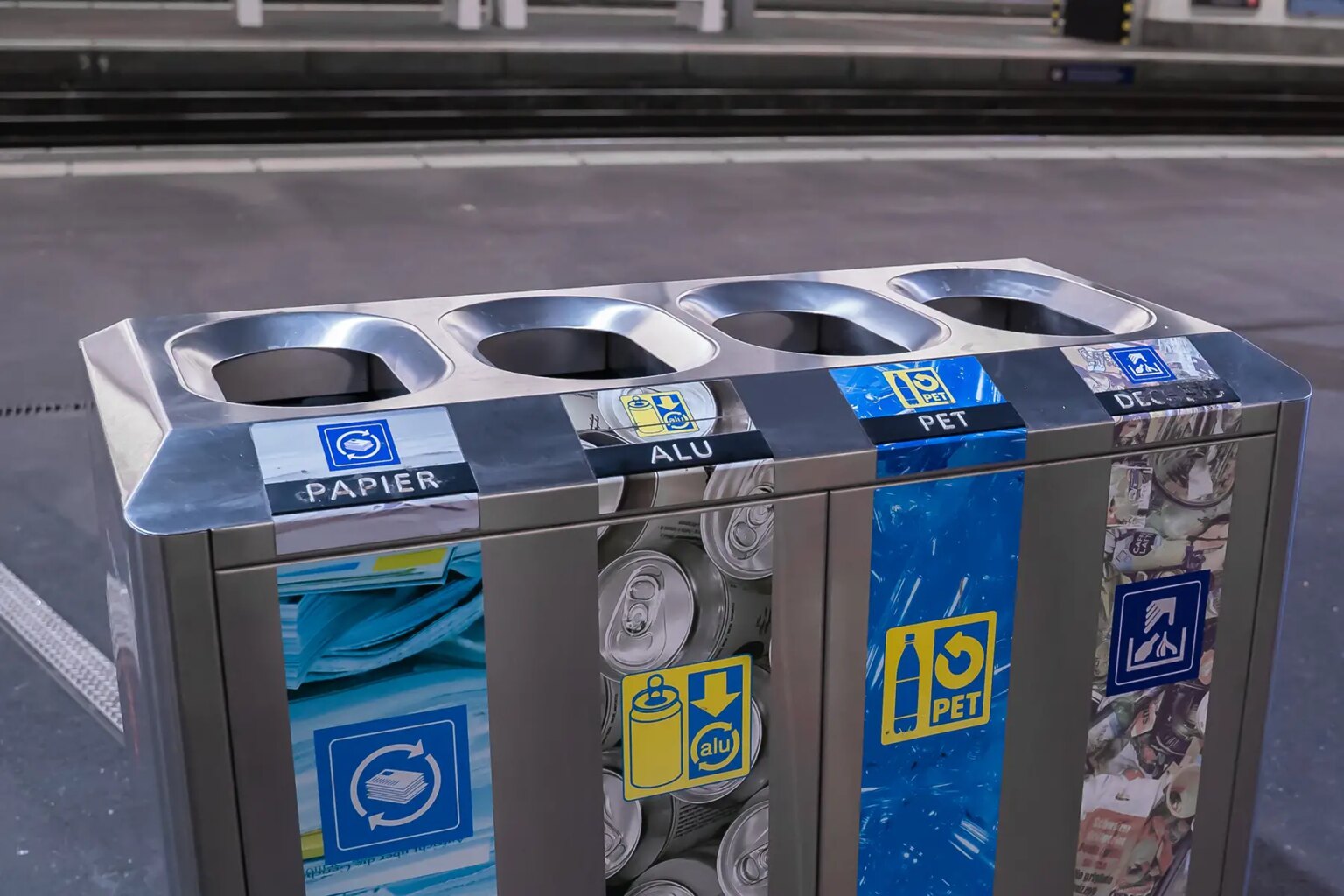For expats, adapting to everyday life in Switzerland can be both exciting and challenging. You will usually have to start with basics like setting up utilities and figuring out the postal service. And, although it’s not the most pleasant of tasks, properly handling recyclables, compost, and garbage can help you live more sustainably and make a smooth transition to your new life in Switzerland.
Read on to discover the finer points of managing trash and recycling, including:
The recycling system in Switzerland
According to Yale University’s 2022 Environmental Performance Index, Switzerland is the third-greenest country in the world, in part due to the country’s clean water supply and robust waste management network. So, it seems perfectly natural that recycling is a way of life there. In fact, Switzerland recycles almost 53% of all the waste it creates, which is one of the highest rates in Europe. The Umweltschutzgesetz (Environmental Protection Act – USG) of 1983 holds residents accountable for the trash they produce with taxes and strict policies. Switzerland’s recycling system is complex but effective, and every type of material has its own method of disposal.
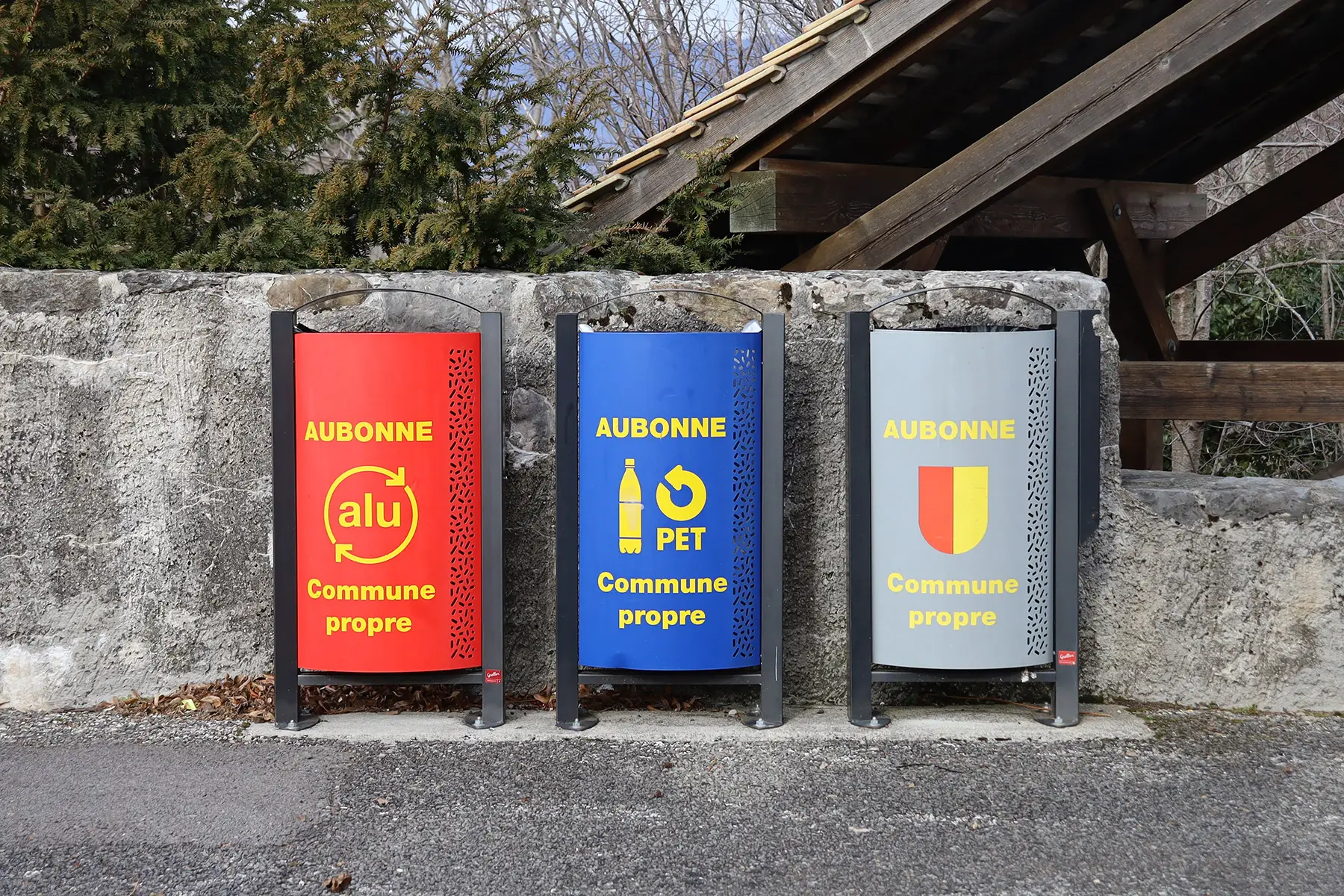
What happens to recycled materials in Switzerland?
Recycled materials are usually either repurposed or reused. Two of Switzerland’s most commonly recycled items are glass and aluminum, both of which are relatively easy to process. Beverage companies often reuse glass bottles after thoroughly cleaning them. Otherwise, the recycling process melts down glass and then reforms it into new glass or adds it to construction materials. For aluminum packaging, metal processors can melt down and reform it any number of times without hurting its quality.
Things like clothing and electronics require a more specialized form of treatment and often end up outside of Switzerland. According to the Bundesamt für Umwelt (Federal Office for the Environment –BAFU/OFEV/UFAM), most recycled clothing is still wearable, so organizations sell or donate it abroad. They usually incinerate clothing and shoes that are not suitable for sale. To recycle electronics, disposal specialists first take them apart and sort the parts. They then typically export the leftover metals outside Switzerland to finish the process.
How to recycle in Switzerland
How exactly to recycle in Switzerland varies depending on where you live. But don’t let that intimidate you – there are plenty of Swiss resources dedicated to helping you figure it out. For example, Dechets.ch has a handy search feature that displays recycling instructions by material type and canton. You can often get a pamphlet on recycling and waste disposal in your community from the local government office. Generally, there are two main ways to recycle, depending on your location and budget.
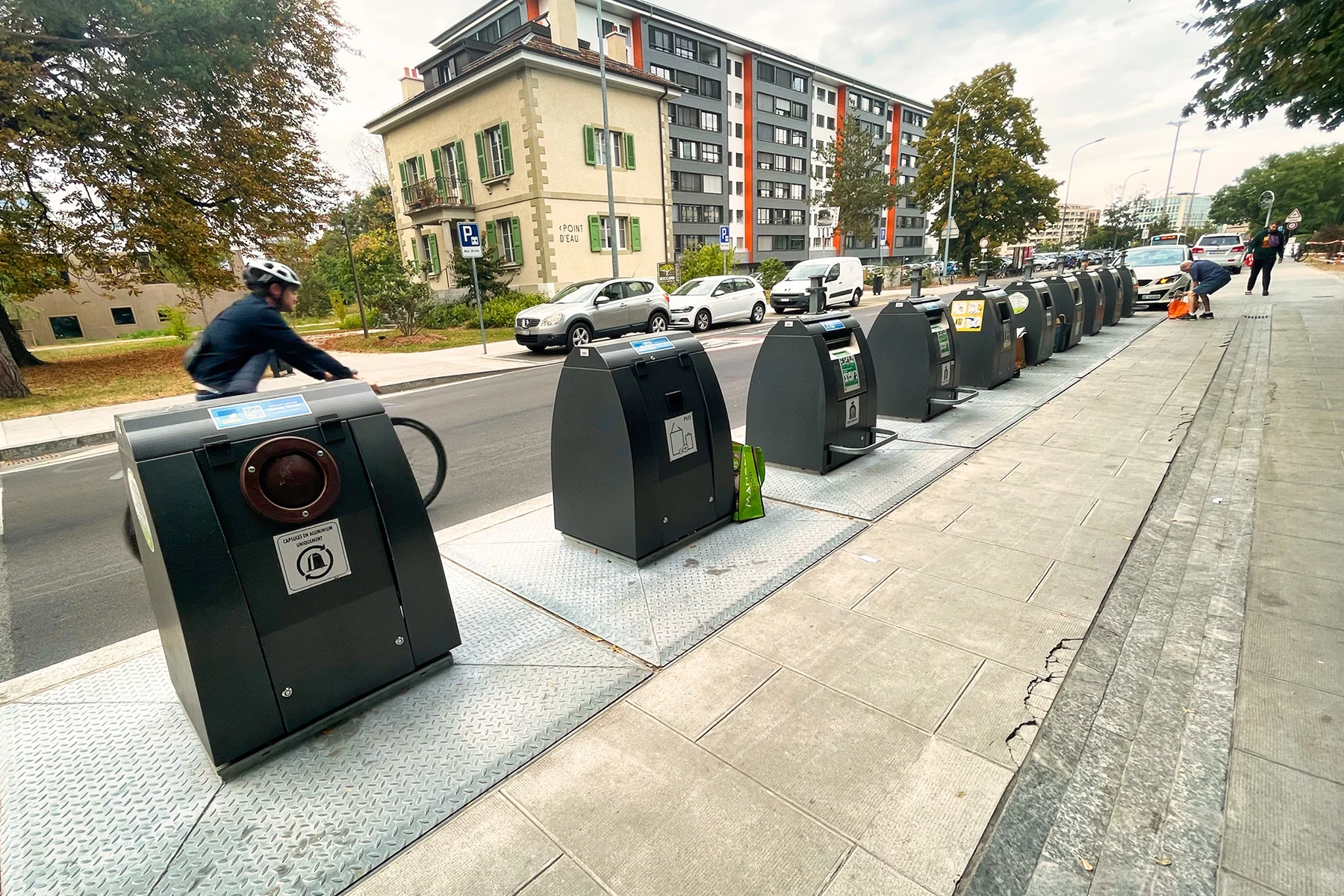
First, you can use public recycling facilities by dropping your recyclables at a public collection point. Recycling-Map provides a helpful and easy-to-use map of recyclable collection points throughout Switzerland. On the bright side, public facilities like this are usually free of charge. But be sure to take note of their operating hours because they’re usually limited. Also, not every collection point accepts all types of materials or items, so you may need to visit a few to recycle everything.
If your recycling is properly sorted and contained, a municipal recycling service can pick it up from your home. Household recycling schedules vary depending on which canton you live in and the municipality may charge a fee for pick-up. To find details on household recycling services in your community, visit Dechets.ch to search by canton.
Recycling paper and cardboard in Switzerland
90% of the paper acquired by Switzerland each year comes from reused waste paper. This highlights the value of recycled paper as a Swiss resource. Since paper and cardboard are some of the most widely recycled materials in Switzerland, you can easily find a public collection point or household pick-up. However, keep in mind that paper or cardboard must be clean and dry to be recycled. Newspapers, notebook paper, copy paper, wrapping paper, cardboard boxes, and envelopes are recyclable. On the other hand, you cannot recycle most paper products that are used with food and drink. This includes paper towels, food labels, parchment paper, and more. Learn more about the specifics of paper recycling through the Swiss Recycle website.
Recycling plastic and PET bottles in Switzerland
Like many countries, Switzerland makes a distinction between common plastic bottles and polyethylene terephthalate (PET) bottles when sorting recyclables. PET bottles, specifically used for beverages, are recognizable by a triangle-shaped symbol on the label. Some recycling facilities accept PET bottles, but you can also return them to special PET bins at grocery stores. Before recycling a bottle, be sure to squeeze out the air and replace the cap. See the Swiss Recycle website for more on PET bottles.
Cosmetics, cooking oils, and dairy products, on the other hand, often use non-PET plastic bottles. Before recycling, you should clean these well, squeeze out the air, and reapply the lid. You can drop off non-PET plastics at a collection point where you purchased the products. With plastic pollution growing rapidly, you may also consider some easy lifestyle changes shown to reduce plastic waste.
Recycling glass in Switzerland
Switzerland reuses or recycles an impressive 94% of its total glass waste. In some communities, there may be a specific bin just for reusable glass and another bin for recyclable glass. When it comes to separating glass, you sort by color (i.e., white/clear, green, brown) – multicolored glass goes in with the green. Note that you cannot recycle light bulbs with packaging glass, so you must care for them separately. For additional detail on glass recycling, see the Swiss Recycle page.
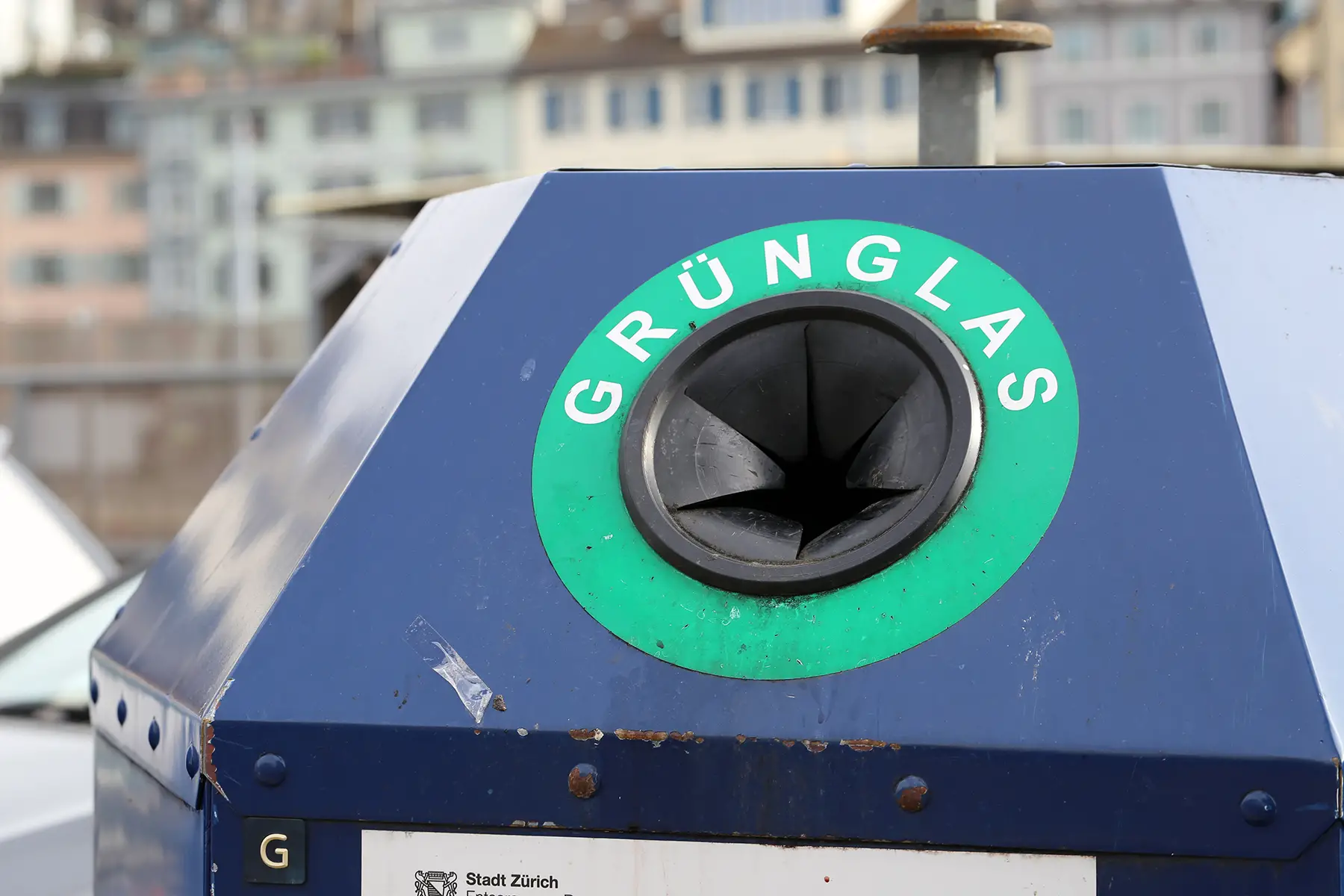
Recycling metal in Switzerland
Another very commonly recycled material in Switzerland is metal, in the form of aluminum packaging and tin cans. As with plastic bottles, be sure to empty and crush aluminum packaging to reduce the overall volume of material. It’s also important to clean tin cans before disposal and completely remove any labels. Suitable containers for recycling metal products are quite common in public places. However, bear in mind that if you use aluminum coffee pods, you can usually only recycle them at specialist shops. Check out the Swiss Recycle website for more information on recycling tin and aluminum.
Recycling clothes and clothing materials in Switzerland
Clothing is probably not the first thing that comes to mind when you think of recycling. But rising purchase and disposal rates have made clothing a serious environmental problem. Since there is not yet a way to recycle clothing fabric and textiles, reuse is the best way to go. In Switzerland, you can find plenty of donation containers that accept men’s, women’s, and children’s clothes and shoes. These organizations may also carry out specialized roadside pick-ups as necessary. They usually accept bed linens and stuffed animals as well, but burn dirty or damaged clothing. You should also tie pairs of shoes together securely before placing them in the bins.
Recycling other household items in Switzerland
Household items also require special care when recycling. Here’s how to recycle some of the most common ones:
- Appliances and electronics: This includes everything from mobile phones to refrigerators to computer parts, which should all go to a specific location for recycling. At the end of their life, you can take electronics and appliances back to the store where you bought them.
- Batteries: There’s a very specific process for recycling dead batteries. Like with electronics, stores take back batteries once they’re no longer functional.
- Furniture: If you have furniture in decent condition that you can’t sell, you can donate it to a charitable organization in Switzerland. Heilsarmee (Salvation Army), for example, arranges free home pick-up for furniture donations in many cities. If your furniture is no longer usable, use Recycling-Map and search for “bulky items” disposal in your area.
- Light bulbs: Make sure you don’t put light bulbs in with the glass recycling. You can recycle fluorescent lamps, energy-saving bulbs, and LEDs by returning them to the store or a collection point. At this time, normal light bulbs are not recyclable, so they belong with the household garbage.
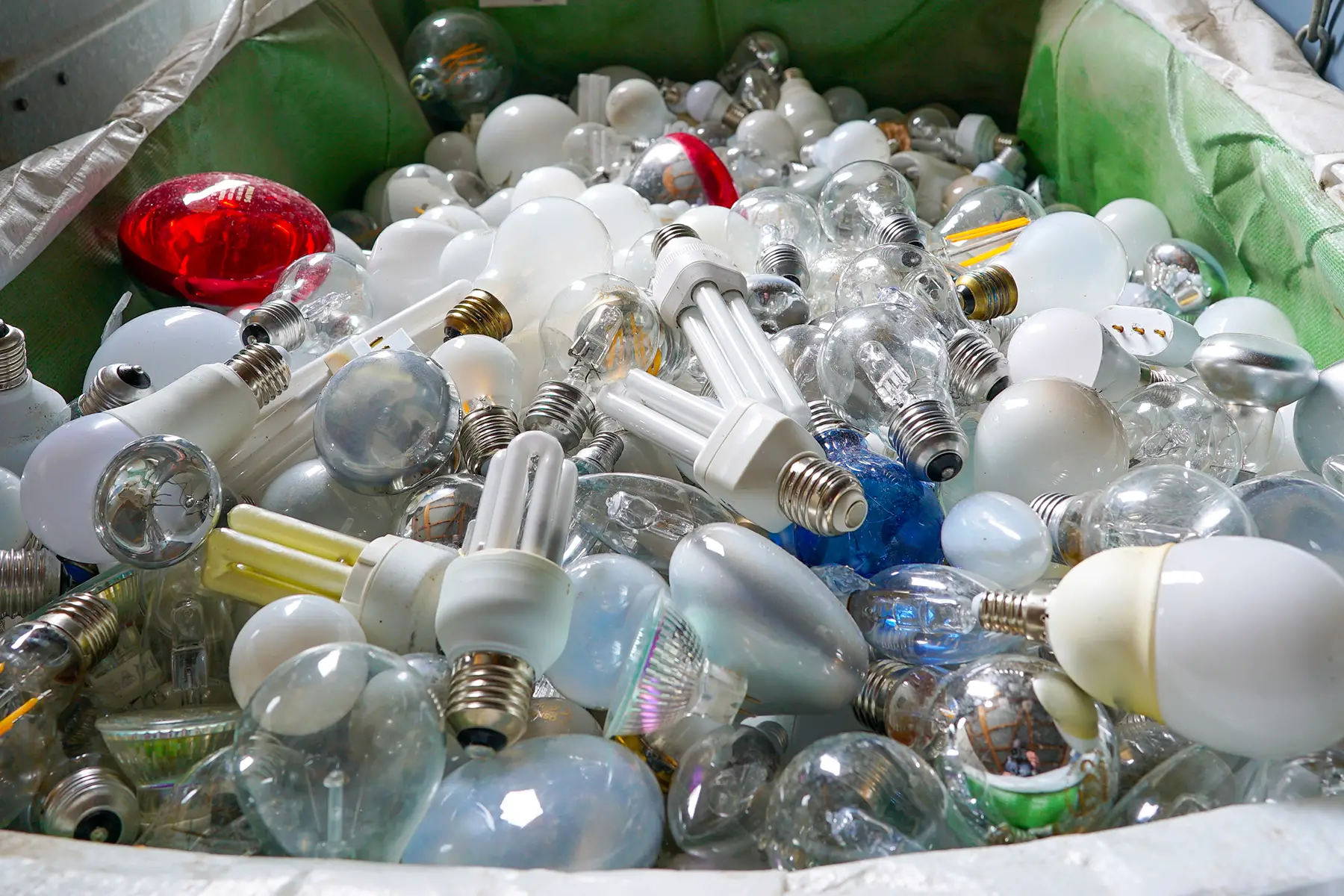
Recycling tips in Switzerland
- Know your local system: In Switzerland, recycling and waste procedures vary by canton and gemeinde, so it’s important to do your research when you move to a new place. This will help you find the correct rules and schedules to follow.
- Make a habit of cleaning and separating: Before you throw items in the bin, start by washing out your recyclables and separating any parts that can’t be recycled together. Soon you’ll have a recycling habit that makes the whole process easier.
- The smaller, the better: Doing your part in recycling also means crushing cans, squeezing bottles, and breaking down cardboard boxes. The less space recycling takes up, the cheaper the transportation costs for the system.
- If you’re not sure, ask: Since recycling is a way of life in Switzerland, feel free to ask your landlord or municipal office about the process. And given that there are penalties for waste violations, it’s better safe than sorry.
Composting in Switzerland
Composting food waste in Switzerland
Since 2000, Switzerland has banned organic waste from landfills, which means residents must dispose of it sustainably. According to BAFU (OFEV/UFAM), food waste is a serious problem and Switzerland has committed to cutting rates in half by 2030. Household food waste includes fruit, vegetables, coffee grounds and filters, tea bags, eggshells, and more. You can put these items into a kitchen scraps container and compost them at home in the backyard or garden. Alternatively, you can drop food waste off at any green waste collection point that accepts it.
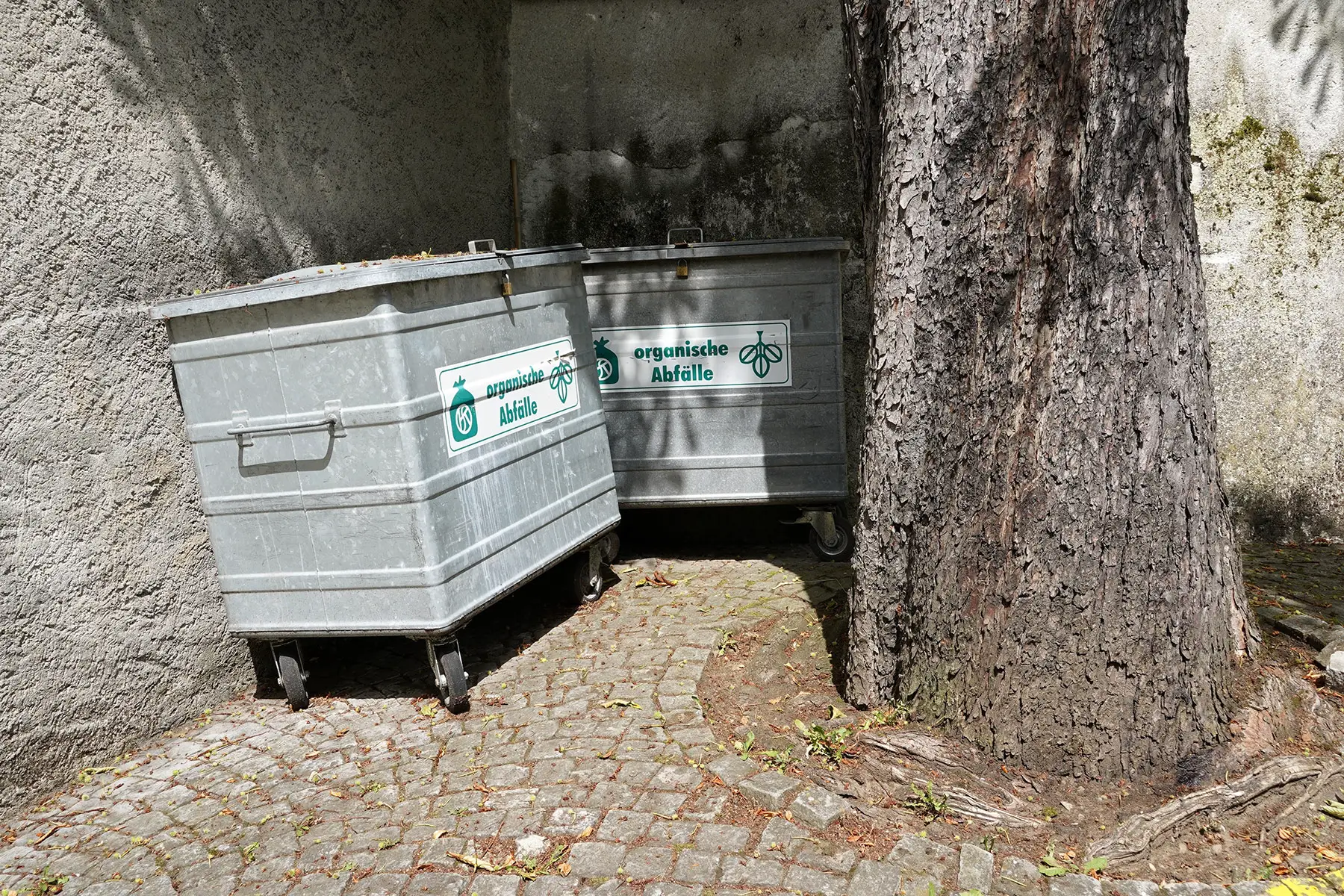
Composting garden waste in Switzerland
Grass and tree trimmings in the summer or raked leaves in the fall can really pile up. Luckily, Switzerland widely composts garden waste and it’s rather easy to find a collection point to drop it off. From there, compost or fermentation centers repurpose the garden waste for agriculture. Be careful to remove any stones or non-organic materials from your garden waste before throwing it in the bin.
Garbage collection in Switzerland
For household waste that isn’t recyclable or compostable, you can use the local municipality’s garbage collection services. In this case, the municipality collects garbage from underground or roadside containers. Most Swiss cantons require special garbage bags or stickers on regular bags for pick-up. You can find these at grocery stores.
When is my garbage collected in Switzerland?
Garbage collection days and times vary by canton. You can use Dechets.ch to find your local garbage collection schedule and see when they pick up in your area. Typically pick-up is either once per week or every two weeks, depending on location. Make sure you only put your garbage out according to the schedule or you could be fined.
Penalties for illegally dumping waste or recycling in Switzerland
Switzerland takes waste and recycling rules very seriously, which includes hefty penalties for illegally dumping waste or recycling. If you throw away incorrectly bagged or unpaid-for garbage, authorities could open the bag and potentially trace it back to your household. The penalty for illegal dumping is a fine of up to CHF 10,000, depending on the rules of the canton.
Useful resources
- Dechets.ch – Waste disposal instructions and garbage collection schedules by canton
- Recycling-Map – Recycling collection points by postcode and material
- Swiss Recycle – Common recyclable items and how to dispose of them
- Bundesamt für Umwelt (BAFU/OFEV/UFAM) – The Swiss government’s A-to-Z waste guide
